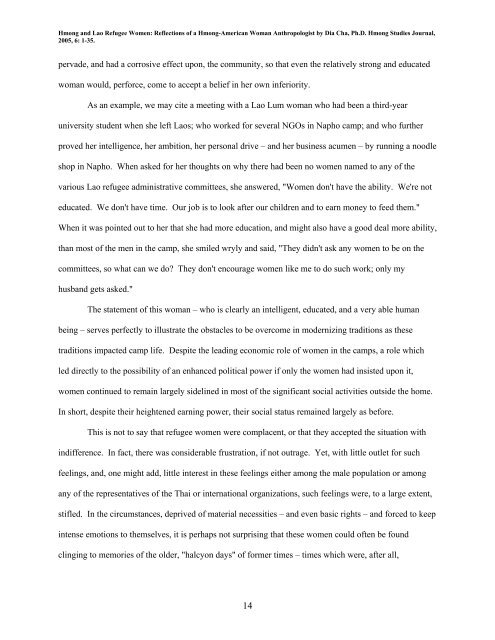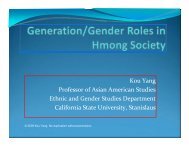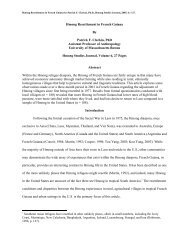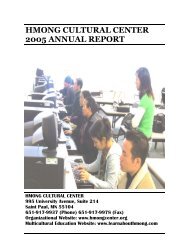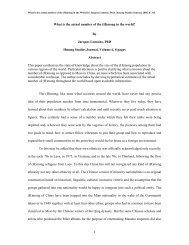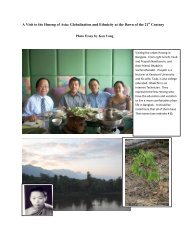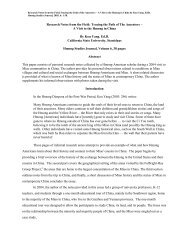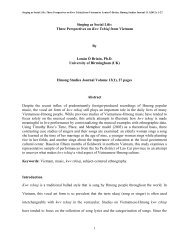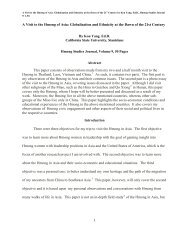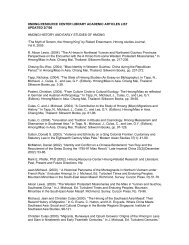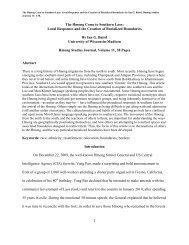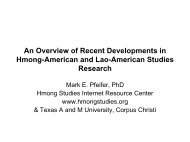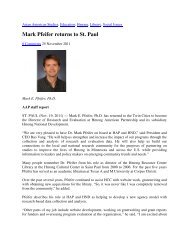Hmong and Lao Refugee Women - Hmong Studies Internet ...
Hmong and Lao Refugee Women - Hmong Studies Internet ...
Hmong and Lao Refugee Women - Hmong Studies Internet ...
You also want an ePaper? Increase the reach of your titles
YUMPU automatically turns print PDFs into web optimized ePapers that Google loves.
<strong>Hmong</strong> <strong>and</strong> <strong>Lao</strong> <strong>Refugee</strong> <strong>Women</strong>: Reflections of a <strong>Hmong</strong>-American Woman Anthropologist by Dia Cha, Ph.D. <strong>Hmong</strong> <strong>Studies</strong> Journal,<br />
2005, 6: 1-35.<br />
pervade, <strong>and</strong> had a corrosive effect upon, the community, so that even the relatively strong <strong>and</strong> educated<br />
woman would, perforce, come to accept a belief in her own inferiority.<br />
As an example, we may cite a meeting with a <strong>Lao</strong> Lum woman who had been a third-year<br />
university student when she left <strong>Lao</strong>s; who worked for several NGOs in Napho camp; <strong>and</strong> who further<br />
proved her intelligence, her ambition, her personal drive – <strong>and</strong> her business acumen – by running a noodle<br />
shop in Napho. When asked for her thoughts on why there had been no women named to any of the<br />
various <strong>Lao</strong> refugee administrative committees, she answered, "<strong>Women</strong> don't have the ability. We're not<br />
educated. We don't have time. Our job is to look after our children <strong>and</strong> to earn money to feed them."<br />
When it was pointed out to her that she had more education, <strong>and</strong> might also have a good deal more ability,<br />
than most of the men in the camp, she smiled wryly <strong>and</strong> said, "They didn't ask any women to be on the<br />
committees, so what can we do? They don't encourage women like me to do such work; only my<br />
husb<strong>and</strong> gets asked."<br />
The statement of this woman – who is clearly an intelligent, educated, <strong>and</strong> a very able human<br />
being – serves perfectly to illustrate the obstacles to be overcome in modernizing traditions as these<br />
traditions impacted camp life. Despite the leading economic role of women in the camps, a role which<br />
led directly to the possibility of an enhanced political power if only the women had insisted upon it,<br />
women continued to remain largely sidelined in most of the significant social activities outside the home.<br />
In short, despite their heightened earning power, their social status remained largely as before.<br />
This is not to say that refugee women were complacent, or that they accepted the situation with<br />
indifference. In fact, there was considerable frustration, if not outrage. Yet, with little outlet for such<br />
feelings, <strong>and</strong>, one might add, little interest in these feelings either among the male population or among<br />
any of the representatives of the Thai or international organizations, such feelings were, to a large extent,<br />
stifled. In the circumstances, deprived of material necessities – <strong>and</strong> even basic rights – <strong>and</strong> forced to keep<br />
intense emotions to themselves, it is perhaps not surprising that these women could often be found<br />
clinging to memories of the older, "halcyon days" of former times – times which were, after all,<br />
14


